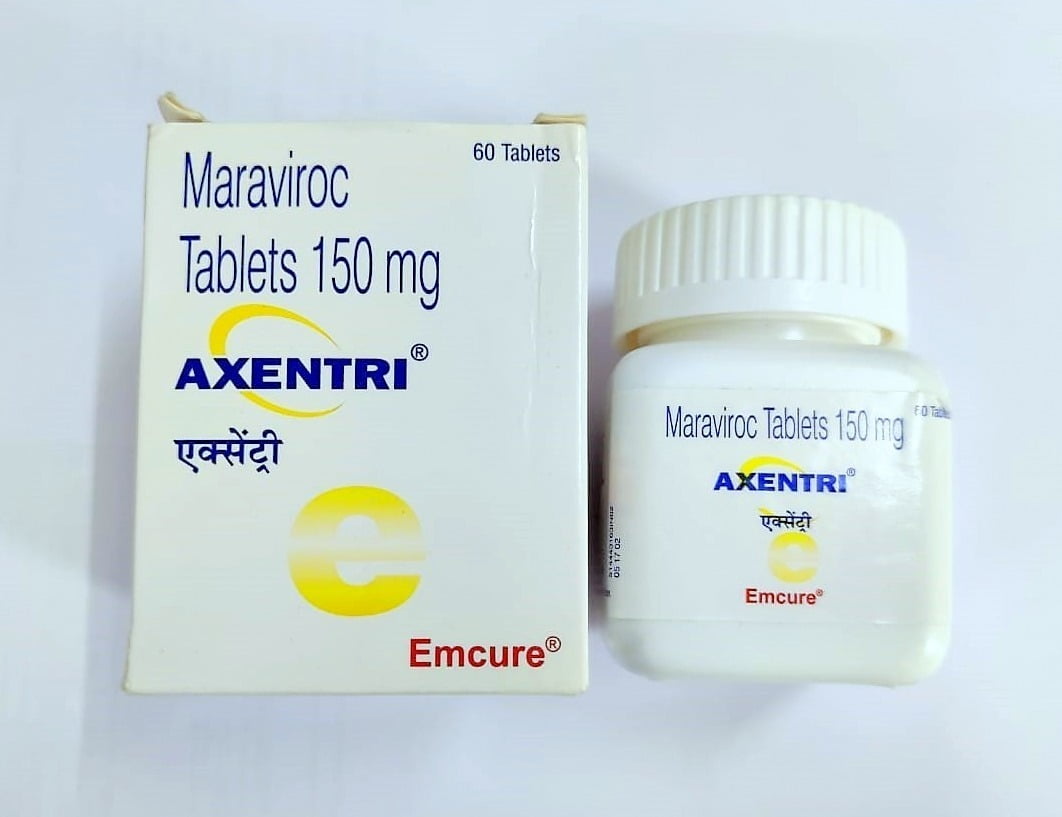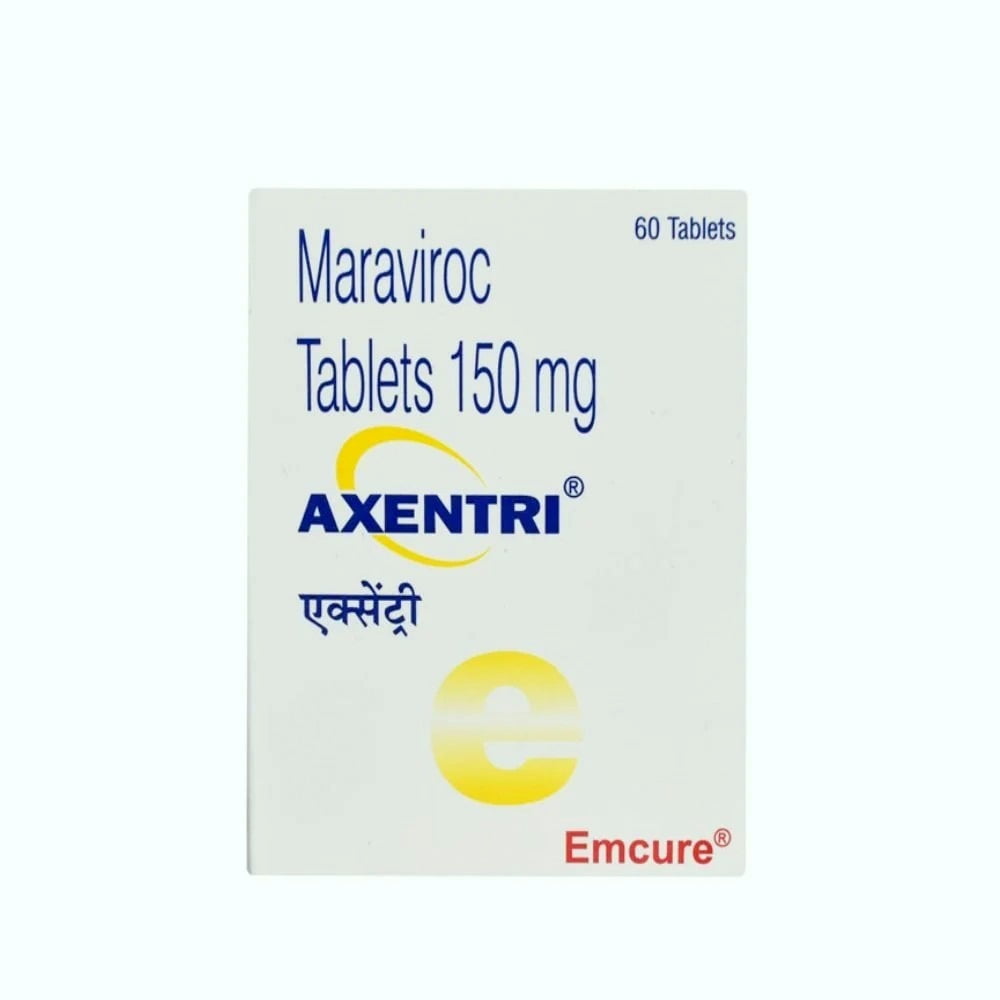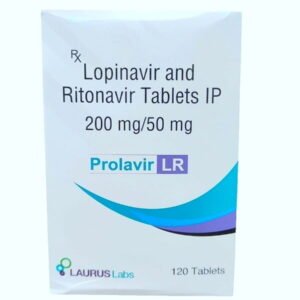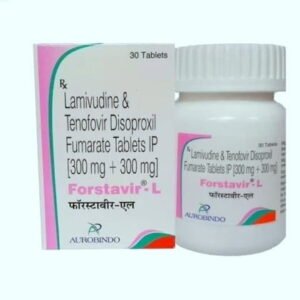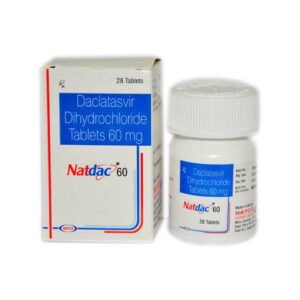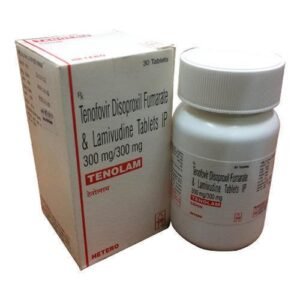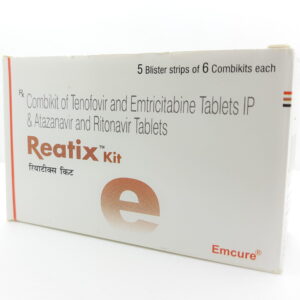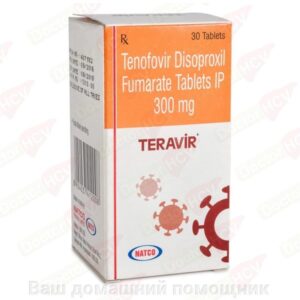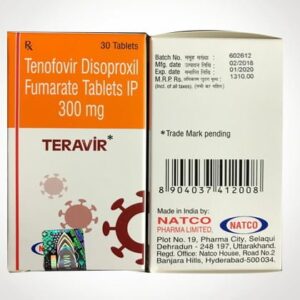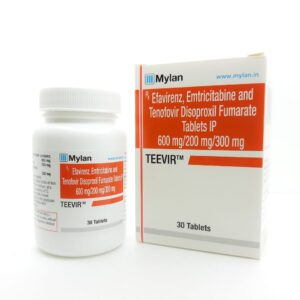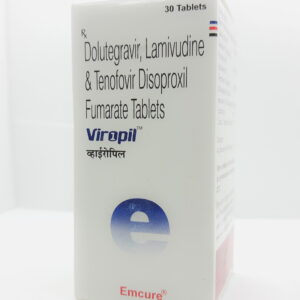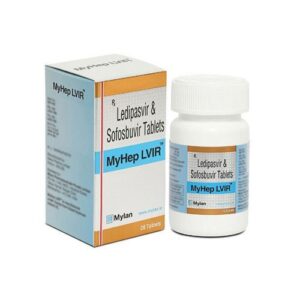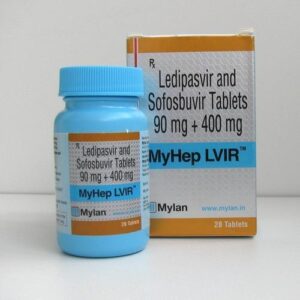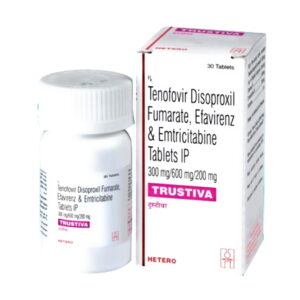Last Updated on July 20, 2024 by admin
Introduction to Axentri 150mg Tablets
Axentri 150mg tablets are a significant advancement in the realm of HIV treatment, specifically designed to combat the human immunodeficiency virus (HIV). These tablets serve as an antiretroviral medication that falls under the category of CCR5 antagonists. The primary purpose of Axentri 150mg is to inhibit the virus’s ability to enter and infect healthy host cells by blocking the CCR5 receptor on the surface of these cells. This mechanism of action makes Axentri 150mg a vital component in the comprehensive treatment of HIV, particularly for individuals who have shown resistance to other forms of antiretroviral therapy.
The development of Axentri 150mg dates back to the early 2000s when researchers identified the CCR5 receptor as a critical entry point for the HIV virus. The discovery led to the synthesis and testing of compounds capable of blocking this receptor. After extensive clinical trials demonstrating its efficacy and safety, Axentri 150mg received approval from the U.S. Food and Drug Administration (FDA) in 2007. Since then, it has been incorporated into various treatment regimens for HIV-positive patients, offering a new line of defense against the virus.
Axentri 150mg tablets are primarily prescribed to adults and children over the age of two who are infected with CCR5-tropic HIV-1, a specific strain of the virus that utilizes the CCR5 receptor for cell entry. The medication is often used in combination with other antiretroviral drugs to enhance its effectiveness and reduce the likelihood of viral resistance. By integrating Axentri 150mg into their treatment plans, patients can achieve better viral suppression and improved immune function, ultimately leading to a higher quality of life and a reduction in HIV-related complications.
Understanding the background, purpose, and development of Axentri 150mg tablets provides a foundational knowledge essential for healthcare professionals and patients alike. This overview sets the stage for a deeper exploration of the uses, benefits, and safety information associated with this crucial medication.
USES OF AXENTRI TABLET
BENEFITS OF AXENTRI TABLET
Uses of Axentri 150mg Tablets
Axentri 150mg tablets are primarily prescribed for the treatment of HIV-1, a major type of Human Immunodeficiency Virus. This medication is particularly effective for individuals whose HIV strains are resistant to other antiretroviral treatments. Axentri 150mg works by blocking the CCR5 co-receptor on the surface of certain immune cells, thereby preventing the virus from entering these cells. This mechanism helps in reducing the overall viral load in the body, thereby improving the patient’s immune function.
Axentri 150mg is often prescribed as part of a combination antiretroviral therapy (ART) regimen. This combination approach enhances the effectiveness of the treatment by attacking the virus at different stages of its life cycle. It is essential for patients to adhere strictly to the prescribed combination therapy to achieve optimal results and prevent the development of drug-resistant strains of HIV.
In addition to its primary use in treating HIV, Axentri 150mg tablets are also being explored for other potential therapeutic applications. These include their use in managing conditions such as graft-versus-host disease (GVHD) and certain autoimmune disorders. However, these alternative uses are still under investigation, and more clinical trials are needed to establish their safety and efficacy in these contexts.
Patients who are considered suitable candidates for Axentri 150mg therapy typically include those with documented CCR5-tropic HIV-1 infection. Healthcare providers will conduct specific tests to determine the tropism of the virus before prescribing this medication. It is also recommended for patients who have experienced treatment failure with other antiretroviral drugs, highlighting its role as a critical option in complex treatment scenarios.
Overall, Axentri 150mg tablets offer a valuable option for HIV-1 management, especially for patients with limited treatment alternatives. Its targeted action in blocking the CCR5 co-receptor allows for a specialized approach in the fight against HIV, making it a crucial component of modern HIV treatment protocols.
SIDE EFFECTS OF AXENTRI TABLET
Common side effects of Axentri
- Nausea
- Rash
- Anemia (low number of red blood cells)
- Insomnia (difficulty in sleeping)
- Weakness
- Increased liver enzymes
- Abdominal pain
- Flatulence
- Loss of appetite
- Depression
Directions for Use
Axentri 150mg tablets are an essential part of the treatment regimen for individuals diagnosed with certain types of HIV. To ensure optimal effectiveness, it is crucial to adhere to the prescribed dosage and administration guidelines provided by your healthcare professional. Typically, the dosage of Axentri 150mg is determined based on several factors, including the patient’s weight, medical condition, and response to treatment.
Patients are generally advised to take Axentri 150mg tablets twice daily, with or without food. Consistency is key, so it is recommended to take the medication at the same times each day to maintain a stable level of the drug in your bloodstream. This helps in maximizing the therapeutic benefits while minimizing the risk of viral resistance.
Swallow the tablets whole with a glass of water. Do not crush, chew, or split the tablets, as this could affect the release and absorption of the medication. If you miss a dose, take it as soon as you remember. However, if it is almost time for your next scheduled dose, skip the missed dose and continue with your regular dosing schedule. Do not double the dose to make up for the missed one.
It is important to follow any additional instructions provided by your healthcare provider, which may include avoiding certain foods, beverages, or other medications that could interact with Axentri 150mg. Regular monitoring by your healthcare provider is necessary to check for any potential side effects or interactions with other medications you may be taking. Always inform your healthcare professional about all the medications and supplements you are currently using to avoid adverse interactions.
Adhering to the prescribed schedule and dosage instructions for Axentri 150mg tablets is essential for the treatment’s success and for minimizing the risk of resistance. Be sure to communicate openly with your healthcare provider about any concerns or questions you might have regarding the use of Axentri 150mg.
Benefits of Axentri 150mg Tablets
Axentri 150mg tablets have garnered significant attention in the medical community due to their efficacy in managing HIV infection. One of the primary benefits of Axentri 150mg is its mechanism of action, which involves blocking the CCR5 co-receptor on the surface of T-cells. This inhibition prevents the HIV virus from entering and infecting the host cells, thereby reducing the viral load in patients. By effectively controlling the replication of the virus, Axentri 150mg aids in maintaining a healthier immune system, which is crucial for those living with HIV.
Clinical studies have demonstrated that Axentri 150mg tablets can significantly improve the quality of life for HIV patients. When used in combination with other antiretroviral therapies, it has been shown to decrease the likelihood of opportunistic infections and HIV-related complications. Patients on Axentri 150mg regimens often experience increased CD4 cell counts, which are essential for a robust immune response. This improvement in immune function translates to a lower risk of infection and a more resilient overall health profile.
Apart from its primary use in HIV management, Axentri 150mg tablets has also been explored for potential benefits in other health conditions. Research indicates that its anti-inflammatory properties might be beneficial in treating certain inflammatory diseases. Additionally, Axentri 150mg tablets ability to block CCR5 has piqued interest in its potential applications for diseases where this receptor plays a role, such as certain cancers and inflammatory conditions. However, these uses are still under investigation and are not yet approved indications for the drug.
In summary, Axentri 150mg tablets offer substantial benefits for HIV patients by reducing viral load, enhancing immune function, and improving overall quality of life. Ongoing research continues to explore the broader implications of its use, potentially paving the way for new therapeutic applications.
SAFETY ADVICE

Alcohol

Pregnancy

Breast feeding

Driving

Kidney

Liver
Storage of Axentri 150mg Tablets
Proper storage of Axentri 150mg tablets is essential to maintain their efficacy and ensure patient safety. Axentri 150mg, like many other medications, requires specific conditions to preserve its therapeutic properties. The ideal storage temperature for Axentri 150mg tablets is between 20°C to 25°C (68°F to 77°F), which corresponds to room temperature. It is advisable to avoid exposing the tablets to extreme temperatures, whether hot or cold, as this can compromise their effectiveness.
In addition to temperature control, Axentri 150mg tablets should be stored in a location that is protected from light and moisture. Exposure to light can degrade the active ingredients, reducing the medication’s potency. Therefore, it is recommended to keep Axentri 150mg tablets in their original container, which is typically designed to shield the contents from light. Furthermore, moisture can cause Axentri 150mg tablets to deteriorate or become less effective. To prevent this, the container should be tightly closed and stored in a dry place. Avoid storing the medication in bathrooms or other damp areas where humidity levels are high.
Specific storage instructions also include keeping Axentri 150mg tablets out of reach of children and pets to prevent accidental ingestion. It is crucial to ensure that the tablets are stored in a secure location that is not easily accessible to unintended users. If a dose is missed, do not attempt to remedy the situation by exposing the tablets to conditions outside of the recommended storage guidelines, as this can further affect their efficacy.
Lastly, always check the expiration date on the medication packaging. Do not use Axentri 150mg tablets past their expiration date, as the safety and effectiveness of the drug cannot be guaranteed beyond this period. Proper disposal methods should be followed for any expired or unused tablets, typically involving returning them to a pharmacy or following local disposal regulations. By adhering to these storage guidelines, patients can ensure the optimal performance of Axentri 150mg tablets throughout their treatment regimen.
Medicinal Benefits of Axentri 150mg
Axentri 150mg is a potent antiretroviral medication primarily employed in the management of HIV infection. It acts as a CCR5 antagonist, which means it blocks the CCR5 co-receptor on the surface of T-cells. This mechanism is crucial because HIV typically utilizes this co-receptor to enter and infect these cells. By obstructing this pathway, Axentri 150mg effectively prevents the virus from infiltrating the immune cells, thereby curbing its ability to replicate and spread within the body.
One of the significant medicinal benefits of Axentri 150mg lies in its unique mode of action. Unlike other antiretroviral drugs that target the virus directly, Axentri 150mg modifies the host cell environment, making it inhospitable for HIV. This approach not only reduces the viral load in the patient’s bloodstream but also helps in preserving the function of the immune system. Consequently, patients using Axentri 150mg in combination with other antiretroviral agents often experience a substantial improvement in their overall immune response.
Beyond its primary use in HIV treatment, Axentri 150mg has shown promise in other therapeutic areas. Research suggests potential benefits in the management of inflammatory disorders due to its ability to modulate immune cell activity. Additionally, ongoing studies are exploring the drug’s efficacy in treating conditions like rheumatoid arthritis and multiple sclerosis, where immune system modulation could prove beneficial.
Moreover, Axentri 150mg safety profile adds to its appeal as a therapeutic agent. Clinical trials indicate that it is generally well-tolerated with fewer adverse effects compared to some other antiretroviral medications. Common side effects are typically mild and include symptoms like cough, fever, and fatigue, which tend to diminish as the body adjusts to the treatment.
In summary, Axentri 150mg offers substantial medicinal benefits, primarily through its innovative action against HIV. Its potential applications in other immunological conditions further underscore its value as a versatile therapeutic agent.
Drug Warnings and Precautions
Axentri 150mg tablets, utilized primarily in the treatment of HIV-1 infection, come with specific warnings and precautions to ensure patient safety. It is imperative to be aware of these risks to prevent potential adverse effects. Firstly, Axentri 150mg is contraindicated in patients with severe renal impairment or end-stage renal disease who are also taking potent CYP3A inhibitors. The co-administration can lead to significant increases in Axentri 150mg plasma concentrations, heightening the risk of severe adverse reactions.
Moreover, patients with a history of cardiovascular issues should exercise caution. Axentri 150mg has been associated with postural hypotension, especially in those with underlying conditions. Regular monitoring of blood pressure is recommended to mitigate the risk of sudden drops, which could lead to dizziness or fainting.
Hepatotoxicity is another critical concern. Cases of hepatic dysfunction, including life-threatening events, have been reported. Symptoms such as jaundice, dark urine, or upper right abdominal pain necessitate immediate medical attention. Liver function tests should be performed before initiating therapy and monitored periodically during treatment.
Patients with co-infections, particularly hepatitis B or C, should be closely supervised. The immune reconstitution inflammatory syndrome (IRIS) may occur, where the immune system begins to recover and inflammatory responses against previously undiagnosed infections emerge. Prompt diagnosis and treatment of such conditions are crucial.
Additionally, Axentri 150mg is not recommended during pregnancy unless absolutely necessary, due to limited data on its effects on the fetus. Women of childbearing potential should use effective contraception while on Axentri 150mg therapy.
Lastly, it’s essential to inform healthcare providers of all medications being taken, including over-the-counter drugs and supplements, to avoid potential drug interactions. Regular consultations and adherence to prescribed dosages are vital to minimize risks and ensure the therapeutic efficacy of Axentri 150mg tablets.
Drug Interactions and Interaction Checker
When taking Axentri 150mg tablets, it is crucial to be aware of potential drug interactions that may impact the medication’s efficacy and safety. Axentri 150mg, an antiretroviral agent used in the treatment of HIV, can interact with various other medications, leading to altered blood levels of either Axentri 150mg or the concomitant drugs. These interactions can either enhance or diminish the therapeutic effects, or increase the risk of adverse reactions.
Known drug interactions with Axentri 150mg include certain antiretroviral agents, antibiotics, antifungals, and anticonvulsants. For instance, Axentri 150mg blood levels can be significantly increased by protease inhibitors such as ritonavir, leading to a higher risk of side effects. Conversely, medications like rifampin, a common antibiotic, can decrease Axentri 150mg effectiveness by reducing its concentration in the bloodstream. Additionally, some antifungal medications like ketoconazole, and anticonvulsants such as carbamazepine, can also affect Axentri 150mg levels.
To navigate these complexities, utilizing a drug interactions checker is highly recommended. A drug interactions checker is a tool that allows patients and healthcare providers to input all currently taken medications and receive an analysis of potential interactions. This tool can help in identifying high-risk combinations and suggest safer alternatives or necessary dosage adjustments. Many online platforms and mobile applications offer interactive drug interaction checkers that are user-friendly and accessible.
When using a drug interactions checker, ensure you enter all prescribed medications, over-the-counter drugs, and dietary supplements, as even non-prescription substances can interact with Axentri 150mg. This comprehensive approach helps in maintaining the therapeutic efficacy of Axentri 150mg while minimizing adverse effects, thereby promoting safer medication practices. Always consult your healthcare provider before making any changes to your medication regimen.
Side Effects of Axentri 150mg Tablets
Axentri 150mg tablets, like any medication, can cause side effects. Understanding these potential side effects is crucial for patient awareness and safety. Most side effects are manageable, but patients should be informed about both common and rare occurrences to ensure proper action can be taken if necessary.
Common side effects of Axentri 150mg tablets include dizziness, fever, and upper respiratory tract infections. Patients may also experience cough, rash, and gastrointestinal issues such as nausea and diarrhea. While these side effects are generally mild and tend to resolve on their own, it is essential to monitor them and consult healthcare providers if they persist or worsen.
Among the rarer side effects, liver problems are noteworthy. Symptoms such as yellowing of the skin or eyes (jaundice), dark urine, and severe stomach pain could indicate liver complications. Immediate medical attention is required if these symptoms appear. Another uncommon but serious side effect is an allergic reaction, which may manifest as severe rash, itching, swelling (especially of the face/tongue/throat), severe dizziness, or trouble breathing. These symptoms necessitate prompt medical intervention.
Additionally, Axentri 150mg has been associated with cardiovascular events in some patients, particularly those with pre-existing heart conditions. Symptoms such as chest pain, irregular heartbeat, or shortness of breath should be taken seriously and reported to a healthcare provider immediately. Other rare side effects include low blood pressure, particularly when standing up, which can cause dizziness or fainting.
Patients taking Axentri 150mg tablets should maintain regular communication with their healthcare provider to monitor any side effects. Reporting new or worsening symptoms promptly helps in managing them effectively. While Axentri 150mg offers significant benefits in managing certain medical conditions, being aware of its side effects ensures that patients can use the medication safely and effectively.
How Axentri 150mg Works
Axentri 150mg is a potent antiretroviral medication utilized primarily in the management of Human Immunodeficiency Virus (HIV) infection. The mechanism by which Axentri 150mg operates is both complex and highly specific, targeting a crucial step in the HIV replication cycle. Axentri 150mg is classified as a CCR5 antagonist, which means it specifically blocks the CCR5 co-receptor found on the surface of certain human cells, such as T cells and macrophages. These cells are vital components of the immune system and are primary targets for HIV infection.
HIV requires access to the CCR5 co-receptor to infiltrate human cells. Once HIV binds to the CD4 receptor on the cell surface, it subsequently needs to interact with the CCR5 co-receptor to facilitate the fusion of the viral envelope with the cell membrane. This fusion is an essential step for the virus to inject its genetic material into the host cell, leading to subsequent replication and propagation of the infection.
Axentri 150mg intervenes by binding to the CCR5 co-receptor, thereby blocking its interaction with HIV. This obstruction prevents the virus from effectively attaching to and entering the host cell. By hindering this critical entry point, Axentri 150mg significantly reduces the ability of HIV to propagate within the human body. Consequently, this mechanism helps to manage the viral load, maintains immune function, and reduces the likelihood of HIV-related complications.
It is important to note that Axentri 150mg is effective only against HIV strains that utilize the CCR5 co-receptor for entry. Some HIV strains use a different co-receptor, known as CXCR4, and Axentri 150mg is not effective against these strains. Therefore, before initiating treatment with Axentri 150mg, a tropism test is usually conducted to determine if the patient’s HIV strain predominantly uses the CCR5 co-receptor. This ensures that the medication will be effective in the individual’s specific context.
General Warnings and Safety Advice
When taking Axentri 150mg tablets, it is essential to adhere to specific safety advice to ensure the medication’s efficacy and minimize potential risks. Patients should be particularly mindful of their lifestyle choices and activities that could interact negatively with the treatment.
First and foremost, patients should inform their healthcare provider about any existing medical conditions, including liver or kidney problems, heart disease, or a history of hepatitis B or C. Axentri 150mg can potentially exacerbate these conditions, and adjustments to the treatment plan may be necessary.
Another critical consideration is the interaction of Axentri 150mg with other medications. Patients must disclose all prescription drugs, over-the-counter medications, and herbal supplements they are taking to avoid harmful interactions. Certain drugs, including rifampin, St. John’s wort, and specific antifungals, can interfere with Axentri 150mg and reduce its effectiveness.
Patients should avoid excessive alcohol consumption while on Axentri 150mg. Alcohol can increase the risk of liver damage, which is a concern for individuals taking this medication. Maintaining a healthy diet and staying hydrated are also advisable to support overall health and the effectiveness of the treatment.
Engaging in safe sexual practices is crucial for patients taking Axentri 150mg, as the medication helps manage HIV but does not cure it. Consistent use of condoms and regular testing for sexually transmitted infections are recommended to prevent the spread of HIV and other diseases.
Additionally, patients should be cautious when engaging in activities that require full alertness, such as driving or operating heavy machinery, until they know how Axentri 150mg affects them. Some individuals may experience dizziness or other side effects that could impair their ability to perform these tasks safely.
Lastly, adherence to the prescribed dosage and schedule is vital. Missing doses or not following the treatment regimen can lead to drug resistance and a decrease in the medication’s effectiveness. Patients should take Axentri 150mg exactly as prescribed by their healthcare provider and consult them immediately if they have any concerns or experience adverse effects.
Diet and Axentri 150mg Tablets
When taking Axentri 150mg tablets, it is essential to consider dietary aspects that may influence the medication’s effectiveness and safety. While there are no stringent dietary restrictions associated with Axentri 150mg, being mindful of certain foods and nutritional habits can promote optimal health outcomes.
Firstly, it is advisable to avoid consuming grapefruit and grapefruit juice while on Axentri 150mg treatment. Grapefruit contains compounds that can interfere with the liver enzymes responsible for metabolizing Axentri 150mg, potentially leading to higher levels of the drug in the bloodstream. This can increase the risk of side effects and complications.
Additionally, maintaining a balanced diet rich in essential nutrients can support overall health and enhance the efficacy of Axentri 150mg . A diet that includes a variety of fruits, vegetables, whole grains, lean proteins, and healthy fats can help bolster the immune system, which is crucial for individuals undergoing antiretroviral therapy.
In some cases, healthcare providers may recommend dietary supplements to address specific nutritional deficiencies. For instance, individuals with compromised immune systems might benefit from supplemental vitamins and minerals such as vitamin D, vitamin B12, and zinc. However, it is important to consult with a healthcare professional before starting any new supplements, as they need to be compatible with Axentri 150mg and other medications being taken.
It is also important to stay well-hydrated while taking Axentri 150mg tablets. Adequate fluid intake helps in the proper functioning of the kidneys and liver, which play a critical role in metabolizing and excreting the medication. Aim to drink an ample amount of water throughout the day and limit the intake of caffeinated and sugary beverages.
Lastly, maintaining a regular eating schedule can aid in minimizing gastrointestinal side effects that may occur with Axentri 150mg. Taking the medication with or without food, as directed by your healthcare provider, can also help in achieving the desired therapeutic effect.
By adhering to these dietary considerations, individuals can help ensure that Axentri 150mg tablets work effectively in managing their condition while minimizing potential adverse effects.
Maraviroc Tablet: Comprehensive Q&A Guide
A little more information: Maraviroc Tablet (Axentri 150mg)
Maraviroc is an antiretroviral medication primarily used in the treatment of Human Immunodeficiency Virus (HIV) infections. Classified under the entry and fusion inhibitor category, Maraviroc (Axentri 150mg) plays a crucial role in preventing HIV from entering immune cells, specifically the CD4 cells, which are vital components of the immune system. By blocking the CCR5 co-receptor on the surface of these cells, Maraviroc effectively slows the progression of HIV infection, helping to maintain immune function and reduce the risk of opportunistic infections.
The importance of Maraviroc (Axentri 150mg) in HIV treatment cannot be overstated. It is often used in combination with other antiretroviral drugs to enhance its effectiveness, creating a comprehensive treatment regimen that targets different stages of the HIV lifecycle. This multi-faceted approach not only helps in better management of the virus but also in improving the overall quality of life for individuals living with HIV.
Commonly known under the brand name Selzentry in the United States and Celsentri in other regions, Maraviroc is available in tablet form. The tablet is typically prescribed to be taken orally, with or without food, as directed by a healthcare professional. Dosage and frequency are determined based on the individual’s medical condition, other medications being taken, and the response to treatment.
Understanding the role and function of Maraviroc within the broader context of HIV treatment is essential for both healthcare providers and patients. As an integral part of antiretroviral therapy, Maraviroc (Axentri 150mg) offers a valuable option for those seeking to manage their HIV infection effectively. Through its targeted mechanism of action, Maraviroc not only helps in controlling the viral load but also aids in preserving the immune system’s integrity, thereby contributing to better long-term health outcomes.
What Is Maraviroc Used For?
Maraviroc is an antiretroviral medication primarily used in the treatment of HIV infection. It is specifically designed to block the CCR5 co-receptor, a protein on the surface of white blood cells that HIV uses to enter and infect the cells. By inhibiting this pathway, Maraviroc (Axentri 150mg) helps prevent the virus from spreading within the body. This makes it an integral component of combination therapy for HIV-infected individuals.
Combination therapy, often referred to as highly active antiretroviral therapy (HAART), involves the use of multiple antiretroviral drugs to effectively manage HIV infection. Maraviroc is typically prescribed alongside other medications, such as reverse transcriptase inhibitors and protease inhibitors, to enhance the overall efficacy of the treatment regimen. By attacking the virus from different angles, combination therapy aims to reduce the viral load to undetectable levels, thereby improving the patient’s immune function and reducing the risk of HIV-related complications.
The importance of Maraviroc in managing HIV cannot be overstated. For patients who have developed resistance to other antiretroviral drugs, Maraviroc offers an alternative mechanism of action. This can be particularly beneficial for individuals with a specific type of HIV called CCR5-tropic HIV-1, which relies heavily on the CCR5 co-receptor for cell entry. By targeting this specific pathway, Maraviroc (Axentri 150mg) provides a tailored approach to treatment, improving outcomes for these patients.
In addition to its primary use in HIV therapy, Maraviroc (Axentri 150mg) has been explored for off-label uses. Research has investigated its potential benefits in treating other conditions, such as graft-versus-host disease (GVHD) in bone marrow transplant patients and certain inflammatory disorders. However, these applications are still under study, and Maraviroc’s efficacy for these conditions has not been definitively established.
Overall, Maraviroc plays a critical role in the comprehensive management of HIV infection, offering a specialized mechanism to combat the virus and contributing to the broader goal of achieving and maintaining viral suppression.
When Is the Best Time to Take Maraviroc (Axentri 150mg)?
Maraviroc is a medication used in the treatment of HIV infection, and understanding the optimal timing for its administration can significantly enhance its efficacy. It is generally recommended to take Maraviroc (Axentri 150mg) at the same times each day to maintain a consistent level of the medication in the bloodstream. This consistency helps in effectively managing the virus and reducing the risk of resistance.
Maraviroc can be taken with or without food, giving patients flexibility in integrating the medication into their daily routines. However, adhering to a regular schedule is crucial. Patients should follow the specific instructions provided by their healthcare providers, as these instructions are tailored to individual health needs and the overall treatment plan.
If a dose of Maraviroc is missed, it is important not to double up on the next dose. Instead, patients should take the missed dose as soon as they remember, provided that it is not too close to the time for the next scheduled dose. If it is almost time for the next dose, they should skip the missed dose and continue with their regular dosing schedule. Consistently missing doses can lead to reduced effectiveness of the medication and an increased risk of HIV resistance.
In summary, the best time to take Maraviroc is consistently at the same times each day, with or without food, as per the guidance of a healthcare provider. If a dose is missed, it should be taken as soon as possible unless it is nearly time for the next dose. Adhering to these guidelines ensures the maximum effectiveness of Maraviroc (Axentri 150mg) in managing HIV infection.
What Are the Long-Term Side Effects of Maraviroc (Axentri 150mg)?
Maraviroc (Axentri 150mg), a CCR5 antagonist used in the management of HIV, has a spectrum of potential long-term side effects that patients need to be aware of. While the medication is generally well-tolerated, some individuals may experience adverse effects that can range from mild to severe. Understanding these side effects and their prevalence is crucial for optimal management and overall health.
Common long-term side effects of Maraviroc include gastrointestinal disturbances such as nausea, diarrhea, and abdominal pain. Some patients report experiencing fatigue, dizziness, and headaches. These side effects are usually manageable and often diminish over time as the body adjusts to the medication.
More rare but severe side effects can also occur. Hepatotoxicity, or liver damage, is a notable risk associated with long-term use of Maraviroc. Signs of liver issues may include jaundice (yellowing of the skin or eyes), dark urine, and significant abdominal pain. Allergic reactions, though rare, can manifest as severe skin rashes or swelling and require immediate medical attention.
Another critical aspect to monitor is cardiovascular health. Maraviroc may potentially increase the risk of cardiovascular events in some patients. Symptoms to watch for include chest pain, shortness of breath, and irregular heartbeats. Neurological side effects, such as mood changes and cognitive impairments, though less common, have also been reported in some cases.
Patients on Maraviroc should have regular consultations with their healthcare providers to monitor these potential side effects. Blood tests to check liver function and other routine examinations are essential for early detection and management of any adverse effects. Lifestyle modifications, including a balanced diet and regular exercise, can also help mitigate some of the side effects.
In conclusion, while Maraviroc (Axentri 150mg) is an effective medication for managing HIV, patients should be vigilant about potential long-term side effects. Regular medical follow-ups and proactive management strategies are key to maintaining health and well-being while on this treatment.
Can You Provide a Review of Maraviroc?
Maraviroc is an antiretroviral medication commonly used in the treatment of HIV. It functions as a CCR5 antagonist, preventing the virus from entering human cells. The efficacy and safety profile of Maraviroc (Axentri 150mg) have been extensively studied in clinical trials and through user experiences, providing a well-rounded view of its performance in managing HIV.
Clinical trial data indicate that Maraviroc is effective in reducing viral load in patients with HIV, particularly when used in combination with other antiretroviral drugs. Studies such as the MOTIVATE trials have demonstrated that Maraviroc (Axentri 150mg), when paired with optimized background therapy, significantly improves virological suppression compared to placebo. It is particularly beneficial for patients with CCR5-tropic HIV-1, showing a marked reduction in viral load and an increase in CD4+ cell counts.
User experiences with Maraviroc are generally positive, with many patients reporting improved management of their HIV symptoms and an enhanced quality of life. Patients appreciate its ability to maintain virological control with a relatively favorable side effect profile. Common side effects include cough, fever, upper respiratory tract infections, and gastrointestinal issues, but these are typically manageable and less severe compared to some other antiretroviral medications.
Expert opinions highlight Maraviroc’s unique mechanism of action as a significant advantage. Unlike other antiretrovirals that target viral enzymes, Maraviroc (Axentri 150mg) targets the host cell receptor, which reduces the likelihood of resistance development. This makes it a valuable option for patients with resistance to other classes of antiretroviral drugs. Moreover, Maraviroc is often praised for its once-daily dosing regimen, which improves patient adherence to the treatment plan.
However, Maraviroc is not without its disadvantages. Its effectiveness is limited to patients with CCR5-tropic HIV-1, necessitating a tropism test before initiation. Additionally, while generally well-tolerated, it may pose a risk for hepatotoxicity, necessitating regular liver function monitoring.
In comparison to other antiretrovirals, Maraviroc offers a unique and effective option for specific patient populations. Its favorable safety profile, combined with its distinct mechanism of action, makes it a valuable component of combination antiretroviral therapy. Ongoing research and patient feedback continue to support its role in the comprehensive management of HIV.
What Are the Common Uses of Maraviroc (Axentri 150mg)?
Maraviroc is primarily prescribed for the treatment of HIV-1 infection in both adults and children. As an antiretroviral medication, it operates by blocking the entry of the virus into human cells, thereby reducing the viral load in the patient’s body. This mechanism of action helps to maintain the immune system’s function and delay the progression of HIV to AIDS. Physicians often recommend Maraviroc (Axentri 150mg) as part of a combination therapy along with other antiretroviral drugs to enhance its efficacy and prevent the development of drug resistance.
Besides its primary use in managing HIV-1 infection, Maraviroc has demonstrated potential benefits in other medical conditions. Research has indicated that Maraviroc (Axentri 150mg) may be effective in treating certain inflammatory diseases due to its ability to inhibit the CCR5 receptor, which plays a role in inflammatory responses. This has sparked interest in exploring its use for conditions like rheumatoid arthritis, multiple sclerosis, and certain types of cancers where inflammation is a key component.
Moreover, studies are ongoing to investigate the broader applications of Maraviroc in other viral infections and diseases characterized by excessive immune activation. While these uses are not yet approved, the preliminary findings are promising, suggesting that Maraviroc (Axentri 150mg) could have a versatile role in future therapeutic strategies. However, it is crucial for patients to follow their healthcare provider’s advice and use Maraviroc only for its approved indications unless part of a clinical trial.
In conclusion, the primary use of Maraviroc remains the treatment of HIV-1 infection in both adults and children. Its potential benefits in other medical conditions are still under investigation, highlighting the importance of ongoing research in expanding its therapeutic applications. Patients should consult with their healthcare providers to understand the best use of Maraviroc in their treatment regimen.
What Is the Recommended Dosage of Maraviroc?
The recommended dosage of Maraviroc, an antiretroviral medication used to treat HIV-1 infection, can vary based on several factors such as age, weight, and concurrent medications. It is crucial to adhere strictly to prescribed guidelines to maximize the drug’s efficacy and minimize potential risks.
For adult patients, the standard dosage of Maraviroc typically stands at 300 mg taken twice daily. However, this dosage may be adjusted depending on the patient’s concurrent medications. For instance, when Maraviroc (Axentri 150mg) is co-administered with strong CYP3A inhibitors (like ketoconazole or ritonavir), the recommended dosage is reduced to 150 mg twice daily. Conversely, if the patient is taking CYP3A inducers (such as efavirenz or rifampin), the dosage may be increased to 600 mg twice daily to maintain adequate drug levels in the bloodstream.
Pediatric patients require careful consideration of both age and weight. For children weighing at least 30 kg, the dosage mirrors that of adults, with adjustments based on other medications as previously outlined. For those weighing between 10 kg and less than 30 kg, the dosage is calculated based on body surface area, typically at 150 mg/m² taken twice daily, but not exceeding the adult dosage. It is imperative to consult a healthcare provider for precise dosing in pediatric cases.
Following the prescribed dosage is critical for the effective management of HIV infection. Deviating from the recommended dosage can lead to suboptimal drug levels, potentially resulting in viral resistance or treatment failure. Overdosage of Maraviroc, though rare, can pose significant health risks, including severe liver toxicity and cardiovascular complications. Patients are advised to take the medication exactly as prescribed and to consult their healthcare provider before making any changes to their regimen.
In summary, the recommended dosage of Maraviroc varies by patient-specific factors and concurrent medications. Adhering to the prescribed dosage ensures the efficacy and safety of the treatment, underscoring the importance of professional medical guidance.
Is Maraviroc (Axentri 150mg) Safe to Use?
Maraviroc, a CCR5 antagonist, has been studied extensively to determine its safety profile. Clinical trials have played a crucial role in evaluating the drug’s safety and efficacy. These trials have shown that Maraviroc (Axentri 150mg) is generally well-tolerated when used as prescribed. The U.S. Food and Drug Administration (FDA) has approved Maraviroc for use in combination with other antiretroviral agents for the treatment of CCR5-tropic HIV-1 infection in adults and pediatric patients. This approval came after rigorous examination of clinical trial data that demonstrated its effectiveness and manageable safety profile.
However, like all medications, Maraviroc is not without its risks. Certain populations should exercise caution or avoid using this medication altogether. For instance, individuals with severe renal impairment or those with a history of severe liver issues should avoid Maraviroc (Axentri 150mg) unless the potential benefits outweigh the risks. Additionally, Maraviroc can interact with other medications, which may alter its effectiveness or increase the likelihood of adverse effects. Notable drug interactions include those with strong CYP3A inhibitors or inducers, such as certain antifungal medications or anticonvulsants, which can affect Maraviroc’s plasma concentration.
Contraindications for Maraviroc use include patients with a known hypersensitivity to any of its components. It is also advised that patients undergo screening for hepatitis B and C viruses before initiating treatment, as co-infection may require additional monitoring. Pregnant or breastfeeding women should consult healthcare providers for a thorough risk assessment before starting Maraviroc.
To ensure the safe use of Maraviroc (Axentri 150mg), healthcare providers recommend regular monitoring of liver function and adherence to prescribed dosages. Patients should be advised to report any unusual symptoms, such as jaundice or severe abdominal pain, which could indicate liver problems. By adhering to these safety measures and consulting healthcare providers for personalized advice, patients can mitigate potential risks associated with Maraviroc.
Comprehensive Guide to Maraviroc (Axentri 150mg) Tablets: Answers to Common Questions
A little more information: Maraviroc Tablets
Maraviroc tablets represent a significant advancement in the treatment of HIV infection. Primarily used as part of combination antiretroviral therapy (ART), Maraviroc (Axentri 150mg) plays a crucial role in managing HIV by preventing the virus from entering human T-cells. The active mechanism of Maraviroc involves targeting and blocking the CCR5 co-receptor on the surface of these T-cells. By obstructing this co-receptor, Maraviroc (Axentri 150mg) effectively hinders the HIV virus from attaching to and penetrating the cells, thus inhibiting its replication and spread within the body.
Understanding the function of Maraviroc (Axentri 150mg) within ART is essential. Combination antiretroviral therapy employs multiple drugs to attack the virus from different angles, which significantly reduces the viral load and delays the progression of the disease. Maraviroc’s unique mechanism complements other antiretroviral medications by offering a different mode of action, thereby enhancing the overall effectiveness of the treatment regimen.
Maraviroc is particularly important for individuals whose HIV strains predominantly use the CCR5 co-receptor for cell entry. Testing for the presence of this co-receptor on the patient’s T-cells is a prerequisite before initiating Maraviroc (Axentri 150mg) treatment, ensuring its suitability and potential efficacy. The use of Maraviroc, therefore, is tailored to specific patient profiles, optimizing the therapeutic outcomes.
Furthermore, Maraviroc tablets have been shown to have a favorable safety and tolerability profile, making them a viable option for long-term HIV management. They offer a critical lifeline for those living with HIV, helping to maintain a better quality of life and reducing the risk of HIV-related complications. This introduction to Maraviroc (Axentri 150mg) tablets underscores their indispensable role in contemporary HIV treatment strategies, highlighting their contribution to the ongoing battle against HIV/AIDS.
Does Maraviroc (Axentri 150mg) Cure HIV Infection?
Maraviroc is not a cure for HIV infection but rather a vital component in the management of the disease. It is classified as an entry inhibitor, which means it works by blocking the CCR5 receptor on the surface of certain immune cells. This prevents the HIV virus from entering and infecting these cells, thereby reducing the overall viral load in the body. By lowering the viral load, Maraviroc (Axentri 150mg) helps to maintain and improve immune function, allowing individuals with HIV to lead healthier and more productive lives.
While Maraviroc is effective in managing HIV infection, it is important to understand that it must be taken in conjunction with other antiretroviral medications. This combination therapy approach is essential for preventing the virus from developing resistance to any one drug. Adherence to the prescribed treatment regimen is crucial for the medication to be effective. Missing doses can lead to an increase in viral load and a decrease in immune function, which can exacerbate the progression of the disease.
Maraviroc has been shown to significantly improve the quality of life for individuals living with HIV. Clinical studies have demonstrated that patients who adhere to their treatment regimens experience a reduction in HIV-related complications and a lower risk of transmission to others. However, it is essential for patients to remain vigilant and continue their treatment as directed by their healthcare provider.
While Maraviroc plays a critical role in managing HIV infection, it is not a standalone solution. Ongoing medical care, regular monitoring, and a commitment to a healthy lifestyle are all integral parts of living well with HIV. Patients should work closely with their healthcare team to ensure that their treatment plan is effective and to address any concerns or side effects that may arise during therapy.
Safety of Maraviroc (Axentri 150mg) During Pregnancy
The safety of Maraviroc, an antiretroviral medication used primarily to treat HIV, is a crucial consideration for pregnant women. Understanding its safety profile during pregnancy can help make informed decisions. Clinical studies and guidelines have provided insights into the use of Maraviroc during this sensitive period.
According to available clinical data, the use of Maraviroc in pregnant women has not been extensively studied. However, animal studies have shown no teratogenic effects, indicating that the drug does not cause birth defects in animal models. Despite this, the lack of comprehensive human data necessitates a cautious approach. The U.S. Food and Drug Administration (FDA) classifies Maraviroc (Axentri 150mg) under Pregnancy Category B, suggesting that while no controlled studies in pregnant women exist, animal studies have not demonstrated a risk to the fetus.
Potential risks associated with Maraviroc use during pregnancy can include the possibility of adverse reactions that may affect both the mother and the developing fetus. These reactions could range from mild to severe and might impact the overall outcome of the pregnancy. Therefore, it is vital to weigh the benefits of controlling HIV infection against any potential risks.
Consulting a healthcare provider is essential before starting or continuing Maraviroc during pregnancy. Healthcare providers can offer personalized advice based on the latest clinical guidelines and the individual’s specific health condition. They can also explore alternative treatment options if necessary. The decision to use Maraviroc (Axentri 150mg) should be made collaboratively, considering the health of both the mother and the unborn child.
In conclusion, while Maraviroc has shown no adverse effects in animal studies, the limited human data calls for careful consideration and medical consultation. Pregnant women should engage in thorough discussions with their healthcare providers to ensure the best possible outcomes for both themselves and their babies.
Use of Maraviroc in Children
Maraviroc, a CCR5 antagonist, is an antiretroviral medication primarily used in the treatment of HIV. While its efficacy and safety in adults are well-documented, the use of Maraviroc (Axentri 150mg) in children has also been a subject of extensive research and clinical trials. The U.S. Food and Drug Administration (FDA) has approved Maraviroc for pediatric use, specifically for children weighing at least 2 kg. This approval is supported by comprehensive studies demonstrating the drug’s safety and efficacy in younger populations.
Dosage recommendations for Maraviroc in children are carefully calibrated based on age and weight to ensure optimal therapeutic outcomes. For instance, children weighing between 10 kg and 20 kg are generally prescribed a dose of 75 mg twice daily, whereas those weighing over 20 kg may receive 150 mg twice daily. These dosages are tailored to maintain the appropriate plasma levels of the drug, thereby maximizing its efficacy while minimizing potential side effects.
Special considerations are necessary when administering Maraviroc to pediatric patients. Children may experience different side effects or require additional monitoring compared to adults. For example, liver function tests are particularly important, as Maraviroc (Axentri 150mg) can affect hepatic enzymes. Moreover, adherence to the medication regimen is crucial, and caregivers play a vital role in ensuring that children take their doses consistently and correctly.
Clinical studies, such as the PENTA 20 trial, have provided robust evidence supporting the use of Maraviroc (Axentri 150mg) in children. These studies indicate that Maraviroc, when used in combination with other antiretroviral drugs, can effectively reduce viral load and improve immune function in pediatric patients with HIV. Guidelines from the World Health Organization (WHO) and the International AIDS Society (IAS) also endorse Maraviroc as a viable option for treating children with HIV, further cementing its role in pediatric antiretroviral therapy.
In conclusion, Maraviroc is a well-established medication for treating HIV in children, backed by rigorous clinical research and international guidelines. Its age-specific dosage recommendations and the necessity for careful monitoring underscore the importance of tailored pediatric care in the management of HIV.
What to Do If You Miss a Dose
If you happen to miss a dose of Maraviroc, it is crucial to follow specific steps to ensure the effectiveness of your treatment and avoid potential complications. Here’s what you need to do:
First, if you remember the missed dose within a short period of time after the scheduled time, take the dose as soon as possible. It is important to resume your regular dosing schedule without delay. However, if you are close to the time of your next scheduled dose, skip the missed dose entirely. In this scenario, simply continue with your regular dosing regimen.
Under no circumstances should you double up on doses to make up for a missed one. Taking two doses too close together can increase the risk of side effects and may compromise the effectiveness of Maraviroc. The key is to adhere to your regular medication schedule as closely as possible to maintain consistent blood levels of the drug.
To help prevent missing doses in the future, consider setting reminders on your phone or using a medication organizer. Consistency in taking Maraviroc (Axentri 150mg) is essential for managing your condition effectively. If you frequently forget to take your medication, it may be beneficial to discuss this with your healthcare provider. They can offer additional strategies or tools to assist you in maintaining a regular medication schedule.
Maintaining a strict adherence to the prescribed regimen of Maraviroc ensures the best possible outcomes in managing your condition. Always consult your healthcare provider if you have any concerns or questions about your medication schedule or if you are unsure of what to do after missing a dose.
Can You Stop Taking Maraviroc (Axentri 150mg)?
Discontinuing Maraviroc (Axentri 150mg) without medical consultation can have significant repercussions. Maraviroc, an antiretroviral medication, plays a crucial role in the management of HIV-1 infection by inhibiting the virus’s ability to enter and infect healthy cells. Abruptly stopping this medication can lead to a viral rebound, where the level of HIV in the bloodstream increases significantly. This rebound can potentially undo the progress made in managing the virus.
Another serious consequence of stopping Maraviroc without guidance is the development of drug resistance. HIV can rapidly mutate, and if the virus is not consistently suppressed by medication, it may develop resistance not only to Maraviroc but potentially to other antiretroviral drugs as well. This resistance can severely limit future treatment options and complicate the management of the infection.
It is imperative to consult a healthcare provider before making any changes to your medication regimen. Physicians can offer tailored advice based on your specific health needs and monitor your condition to ensure that any modifications do not adversely affect your overall health. They may devise a strategy to safely discontinue Maraviroc if it is deemed necessary, potentially including a transition to alternative therapies that continue to effectively manage the virus.
Moreover, sudden cessation of Maraviroc can have a broader impact on your immune system and overall health. The immune system might become weakened, increasing susceptibility to opportunistic infections and other health complications. Continuous medical oversight is essential to maintain health stability and achieve the best possible outcomes in HIV treatment.
In conclusion, stopping Maraviroc without medical advice can lead to serious health risks, including viral rebound and drug resistance. Always consult your healthcare provider to make informed decisions about your medication and ensure the effective management of your health condition.
Possible Drug Interactions and Precautions
When taking Maraviroc tablets, it is crucial to be aware of potential drug interactions that could affect its efficacy or increase the risk of adverse effects. Common medications known to interact with Maraviroc (Axentri 150mg) include other antiretrovirals, antibiotics, and antifungal medications. For instance, combining Maraviroc with other antiretroviral drugs like protease inhibitors or non-nucleoside reverse transcriptase inhibitors could either increase or decrease Maraviroc levels in the bloodstream. This alteration might necessitate dosage adjustments to maintain optimal therapeutic levels while avoiding potential toxicity.
Antibiotics, such as clarithromycin and rifampin, can also impact Maraviroc’s effectiveness. Clarithromycin may increase Maraviroc (Axentri 150mg) levels, while rifampin could decrease them, potentially compromising the drug’s ability to combat HIV infection effectively. Similarly, certain antifungal medications like ketoconazole and itraconazole can elevate Maraviroc concentrations, necessitating close monitoring and possible dose modifications. It’s essential to inform healthcare providers about all medications being taken, including over-the-counter drugs and herbal supplements, to ensure safe and effective use of Maraviroc.
Beyond drug interactions, there are general precautions to consider while using Maraviroc. Monitoring for side effects, such as dizziness, liver problems, and cardiovascular issues, is vital. Patients should promptly report any unusual symptoms to their healthcare provider. Adhering to the prescribed dosage and not altering the medication regimen without medical advice is crucial in managing HIV effectively and preventing resistance development. Additionally, regular medical check-ups and blood tests are recommended to track the drug’s impact on the body and make any necessary adjustments.
By understanding potential drug interactions and adhering to prescribed precautions, patients can maximize the benefits of Maraviroc while minimizing risks, contributing to more effective HIV management.
Where to Find More Information and References
For individuals seeking to deepen their understanding of Maraviroc tablets, a wealth of resources are available that provide comprehensive information. Clinical guidelines, research studies, and official websites offer reliable and up-to-date data on this antiretroviral medication.
One primary source of information is the U.S. Food and Drug Administration (FDA) website. The FDA provides detailed drug labels, approval history, and safety alerts for Maraviroc. This can be particularly useful for understanding the regulatory background and any potential updates concerning the drug’s usage.
Similarly, the World Health Organization (WHO) offers extensive resources on antiretroviral therapies. Their guidelines often include Maraviroc, emphasizing its role in the global fight against HIV/AIDS. The WHO’s database also includes research studies and reports that highlight the efficacy and safety profile of Maraviroc in different populations.
Clinical guidelines from professional organizations such as the HIV Medicine Association (HIVMA) and the Infectious Diseases Society of America (IDSA) are invaluable. These guidelines provide evidence-based recommendations on the use of Maraviroc in various clinical scenarios, ensuring that healthcare providers are well-informed on best practices.
For those interested in the latest research, databases like PubMed offer access to a vast array of peer-reviewed studies. These articles can provide insights into ongoing research and emerging data on Maraviroc, contributing to a deeper understanding of its mechanisms, benefits, and potential side effects.
Patients and caregivers can also benefit from patient support groups and educational materials. Organizations such as the AIDSinfo and the Body offer resources that include patient-friendly explanations, support networks, and personal stories. These platforms can be invaluable for those seeking community support and practical advice on managing HIV treatment with Maraviroc.
References:
- Celsentri 150 mg film-coated tablets – patient information leaflet (PIL) – (EMC). Available at: https://www.medicines.org.uk/emc/product/11436/pil [Accessed on 11th May 2023].
- GlaxoSmithKline, U.S. Food & Drug Administration, [Revised on Dec 2016] [Accessed on 11th May 2023] https://www.accessdata.fda.gov/drugsatfda_docs/label/2016/208984_022128s017lbl.pdf
- Sharon Safrin, Lange’s Basic & Clinical Pharmacology, 14th Edition, 2018, Antiviral Agents, 863-894.
- KD Tripathi, Antiviral Drugs (Anti-retrovirus), Essentials of Medical Pharmacology, 8th Edition, 2019, 860-872.

